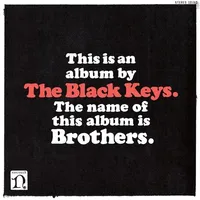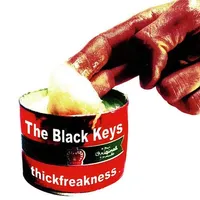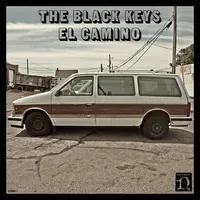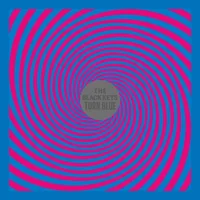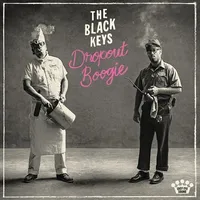"Auerbach and Carney have an innate gift for absorbing the plurality of rock music and turning it into something nervy, fresh and euphoric": The Black Keys albums you should definitely listen to
Taking the blues as their starting point and then giving it a twist, the Black Keys have created an energetic new strand of an old genre

A pair of scrawny kids from the industrial heartland of Akron, Ohio, The Black Keys never had the pedigree or mysterious allure of their similarly blues-inclined counterparts The White Stripes. Yet The Black Keys’ has been one of the more remarkable ascents of recent times. Two decades ago they were goofing off in the basement, figuring out how they could play their first show. Today the duo of Dan Auerbach (vocals, guitar) and Patrick Carney (drums) fill theatres and arenas the world over and enjoy the kind of superstar status that’s seen them rack up multiple Grammys and platinum sales.
Formed in 2001, The Black Keys took the raw spirit of the Delta as their entry point, before fucking with its form. The duo’s approach was always more inclusive though, treating the blues as a fluid entity through which they could streak it with heavy daubs of hip-hop, punk, hard-edged R&B and swampy Southern soul. Even in their formative days, Auerbach and Carney had an innate gift for absorbing the plurality of rock music and turning it into something nervy, fresh and ultimately euphoric.
They certainly never followed the easy route. Their debut, 2002’s The Big Come Up, was the first of three albums made in Carney’s basement, recorded in primitive lo-fi fashion on a cheap four-track. Follow-up Thickfreakness was largely the product of a 14-hour session with an old Tascam recorder, all the better to experience the spitting charge of the duo’s elemental garage-blues. By Rubber Factory (2004) they’d graduated to a disused tyre mill and cranked the noise through a rusted old console that served to make the Keys’ sound more expansive and sinister.
It wasn’t until fifth album Attack & Release (2008), their second on major label affiliate Nonesuch, that Auerbach and Carney headed into a studio and worked with an outside producer: Brian Burton, aka Danger Mouse. The songs were more ambitious, making use of guest musicians and a broader palette of sounds. It was their first record to dent the US Top 20, something they built on to glorious effect with next effort Brothers, issued two years later. Its combustible mix of pounding riff-rock and fat grooves suddenly blew them out into the lap of the wider world, where stadiums and mega-sales awaited.
Despite their huge success since, from 2014’s Billboard-topping Turn Blue to 2024’s Ohio Players, the pair appear not to have changed much. “We still work the same way,” says Carney. “We make stuff up in the studio, start goofing around, and the demos become the final record. It’s just like when we started out”.

Attack & Release (Nonesuch, 2008)
For their fifth album, the Keys finally broke with tradition and headed for a real studio, teamed up with an outside producer (Danger Mouse) for the first time and roped in a few guests. The result was that the arrangements were more considered and the songs more spaciously crafted.
The slow moan of Lies is a highlight, as is the rollicking I Got Mine, both tunes salvaged from an aborted project with the late Ike Turner. No longer reliant on the guitar-and-drums format, there’s even room for delicacy on Remember When (Side A) and Things Ain’t Like They Used To Be, the latter a duet between Auerbach and teenage country singer Jessica Lea Mayfield.
After time apart for a couple of respective solo projects, Auerbach and Carney seemed galvanised by the return to all things Keys. Brothers, recorded in less than a fortnight, was a blinding set of fucked-up blues songs that finally brought the band’s commercial breakthrough in the US and bagged them three Grammys in the process.
Fuzz guitars, huge drums and phased keyboards gave standouts like Howlin’ For You and Next Girl an epic feel, without sacrificing any of the band’s primal urgency. There were even moments of subtle beauty, as on the lysergic The Only One and the unexpected harpsichord flourish of Too Afraid To Love You.
An audacious debut recorded in the basement of Carney’s home on a tiny four-track, before they’d even played a gig. Defiantly lo-fi and scuffed at the margins, Auerbach and Carney’s unrepentant garageblues has real purpose and sackfuls of attitude.
The duo’s less-celebrated hip-hop influence is to the fore on a brilliantly wired cover of Junior Kimbrough’s Do The Rump. There’s further evidence of their eclectic roots on spirited renditions of songs by RL Burnside (Busted) and Muddy Waters (Run Me Down), plus an unlikely tilt at The Beatles’ She Said, She Said. Total budget: $1,000.
Thickfreakness (Fat Possum, 2003)
The product of one near-continuous recording session, the songs here are significantly stronger than on their debut. This is the sound of the Delta being unceremoniously dragged through punk’s grinder by two suburban kids trying to decode the dark secrets of the blues by sheer force of will.
There are hip-bumping grooves aplenty, not least on Midnight In Her Eyes, and a blazing cover of Richard Berry’s Have Love Will Travel, based on The Sonics’ brutal version. Coining its title from the Japanese phrase ‘Inazuma Rockin’ Blues’ (‘inazuma’ means ‘flash of lightning’), this record more than justifies its billing.
Dan Auerbach - Keep It Hid (Nonesuch, 2009)
Opting to take time away from each other gave Carney the chance to record with new project Drummer, while Auerbach indulged his love of vintage 60s equipment by recording Keep It Hid in his new studio in Akron. Inspired by the fuzz bass on 60s albums by The Uniques and Marty Robbins, he pressed his DNA into swamp-soul tunes that also took liberal swabs from blues and psychedelia.
There’s a playful cover of Jon & Robin’s I Want Some More, while the home fires are kept burning by contributions from his uncle, guitarist/singer James Quine, and a version of Whispered Words (Pretty Lies), written by Auerbach’s father
Having reunited with producer Danger Mouse, the Keys consolidated the success of Brothers by pouring myriad influences – rockabilly, glam, soul, early R&B – into a set of tunes that were clearly built for big spaces. The idea, in their own words, was to create “efficient rock’n’roll songs and minimal instrumentation”, with simplicity the key element.
Big hooks are everywhere, from the Zep-shaped bounce of Money Maker to the strutting Little Black Submarines, while Gold On The Ceiling and Lonely Boy had audiences punching the air. The album sold over 200,000 copies in its first week alone.
Rubber Factory (Fat Possum, 2004)
Out of the basement, for their third album they rented the entire second floor of an abandoned tyre factory (hence the title) and renamed it Sentient Sound. Not that it brightened the corners of their music to a marked degree.
If anything, Rubber Factory is dirtier and more brutal than what they’d done before, as evinced by the hissing Girl Is On My Mind (inspired by The Sonics’ Shot Down) or the cover of Louisiana bluesman Robert Pete Williams’s Grown So Ugly. There’s also a more expansive feel to much of the record, as on When The Lights Go Out (used in the film Black Snake Moan) and the loping slide-blues of baleful The Lengths.
Arriving two-and-a-half years after El Camino - partly due to Auerbach’s increasing role as producer for others: Lana Del Rey, Dr. John, Ray LaMontagne, Grace Potter - the Keys’ eighth studio effort dials back the riffy rock in favour of broody excursions into psychedelia and soul, enlivened by outbreaks of funk. Auerbach’s recent divorce appears to inform Turn Blue’s pensive tone, exemplified by the title track and seven-minute opener Weight Of Love.
He and Carney, alongside returning producer/co-writer Danger Mouse, duly fashion a compelling, sometimes lush suite of songs that both stretch and deepen the band’s oeuvre in surprising ways, from the post-Motown shimmy of Fever to the lysergic Bullet In The Brain. It also gave them their first chart-topping album Stateside.
Dropout Boogie (Easy Eye Sound/Nonesuch, 2022)
The Keys chose to follow 2019’s no-frills Let’s Rock and 2021’s blues covers set Delta Kream with an album that re-established their guitar credentials, inviting along a handful of guests in the process. The unmistakable sound of ZZ Top’s Billy Gibbons drives the Texan fuzz-boogie of Good Love, while the vampy Wild Child shares writing credits with Reigning Sound’s Greg Cartwright and sometime Taylor Swift collaborator Angelo Petraglia.
Rather than mine the experimental approach of its Captain Beefheart-indebted title, much of Dropout Boogie instead tends to play to type, shoring up the duo’s reputation rather than expanding it. Then again, as the jubilant Your Team Is Looking Good and Didn’t I Love You prove, why fix something that ain’t broke.
...and some to avoid
You can trust Louder
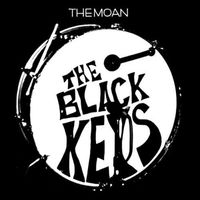
Various
There’s no such thing as a no-go area in the Keys’ catalogue, but some releases are less essential than others. Chulahoma: The Songs Of Junior Kimbrough finds Auerbach and Carney paying tribute to one of their primary influences with seven covers of the late bluesman’s tunes.
The extended EP is topped off with a curious answerphone message from Kimbrough’s widow. And you can probably do without A Blueprint Of Something Never Finished (2003), a split EP with The Six Parts Seven. Similarly, The Moan ticks the ‘for completists only’ box. Two tracks are alternative cuts from Thickfreakness and The Big Come Up.
Sign up below to get the latest from Classic Rock, plus exclusive special offers, direct to your inbox!
Freelance writer for Classic Rock since 2008, and sister title Prog since its inception in 2009. Regular contributor to Uncut magazine for over 20 years. Other clients include Word magazine, Record Collector, The Guardian, Sunday Times, The Telegraph and When Saturday Comes. Alongside Marc Riley, co-presenter of long-running A-Z Of David Bowie podcast. Also appears twice a week on Riley’s BBC6 radio show, rifling through old copies of the NME and Melody Maker in the Parallel Universe slot. Designed Aston Villa’s kit during a previous life as a sportswear designer. Geezer Butler told him he loved the all-black away strip.

